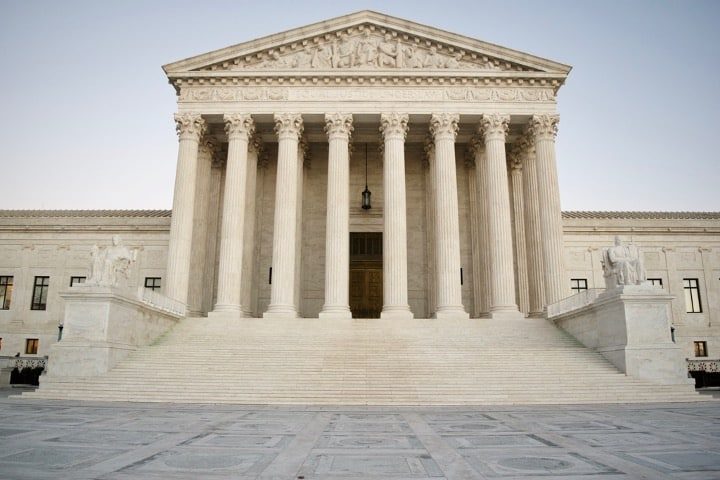
In the unanimous Supreme Court decision published Monday, Trump v. Anderson, even the liberal justices — Ketanji Brown Jackson, Sonia Sotomayor, and Elena Kagan — concurred that Colorado’s attempt to keep Donald Trump’s name off the primary ballot was wrong.
In oral arguments, the issue of “insurrection” was scarcely mentioned, and in the 20-page decision not at all. Instead, the high court whiffed when it could have affirmed that, in fact, there was no “insurrection” on January 6 and therefore on that basis the Colorado high court’s decision should be reversed.
By ruling instead that Colorado — and states in general — does not have the power under Amendment 14 to eliminate the names of individuals running for federal offices, it avoided and therefore left standing the assumption that Trump did engage in insurrection. And that’s unfortunate because that issue is bound to come up in other litigation against the former president in efforts to keep him from serving a second term.
The ruling was simple:
A group of Colorado voters contends that Section 3 of the Fourteenth Amendment to the Constitution prohibits former President Donald J. Trump, who seeks the Presidential nomination of the Republican Party in this year’s election, from becoming President again.
The Colorado Supreme Court agreed with that contention. It ordered the Colorado secretary of state to exclude the former President from the Republican primary ballot in the State and to disregard any write-in votes that Colorado voters might cast for him.
Former President Trump challenges that decision on several grounds. Because the Constitution makes Congress, rather than the States, responsible for enforcing Section 3 against federal officeholders and candidates, we reverse.
The question the high court sought to answer wasn’t whether or not Trump had engaged in insurrection, but instead, “Did the Colorado Supreme Court err in ordering President Trump excluded from the 2024 presidential primary ballot?”
That was easy: “Concluding that it did, we now reverse.”
Once the insurrection question was buried, the rest was easy: Under the 14th Amendment, states “have no power … to enforce Section 3 with respect to federal offices, especially the Presidency.” State offices? Yes. Federal offices? No.
“Nothing in the Constitution delegates to the States any power to enforce Section 3 against federal officeholders and candidates,” wrote the unanimous opinion.
Lawyers for Colorado had little rebuttal. They could find but one example in the nation’s history where Section 3 had been applied, and it concerned a state official more than a hundred years ago. Any claim that Colorado made “that the Constitution grants the States freer rein than Congress to decide how Section 3 should be enforced with respect to federal offices is simply implausible,” wrote the high court.
The decision pointed out the chaotic ramifications if states did have the power to interfere with federal elections: “The result could well be that a single candidate would be declared ineligible in some states, but not others, based on the same conduct … this disruption would be all the more acute — and could nullify the votes of millions and change the election result…. Nothing in the Constitution requires that we endure such chaos.”
In a concurring opinion, Justice Amy Coney Barrett said it was an easy decision to make: “I agree that the States lack the power to enforce Section 3 against Presidential candidates. That principal is sufficient to resolve this case, and I would decide no more than that.”
Although the three liberals all agreed with the decision, they wrote that the six conservatives on the court went too far:
Today, the Court departs from that vital principle, deciding not just this case, but challenges that might arise in the future.
In this case, the Court must decide whether Colorado may keep a Presidential candidate off the ballot on the ground that he is an oathbreaking insurrectionist and thus disqualified from holding federal office under Section 3 of the Fourteenth Amendment.
Allowing Colorado to do so would, we agree, create a chaotic state-by-state patchwork, at odds with our Nation’s federalism principles. That is enough to resolve this case.
Yet the majority goes further.
The high court, wrote the liberal trio, reached beyond in order to create a precedent for the future: “The [conservatives continue] on to resolve questions not before us.… The Court opines on how federal enforcement of Section 3 must proceed.”
Whether that alleged “overreach” by the conservatives on the bench will impact future charges brought under the 14th Amendment remains to be seen.
What is clear is that the entire court deliberately and intentionally stayed away from settling the primary issue at hand, which served as the basis upon which the Colorado courts ruled against Trump: Did he, or did he not, participate in an “insurrection” on January 6, 2020? That question will continue to plague the former president until it is resolved, hopefully in his favor, in the future.
Related articles:



